Editor:
Brandon Sweet
University Communications
bulletin@uwaterloo.ca
Moths are the new tool to protect Canada's wetlands
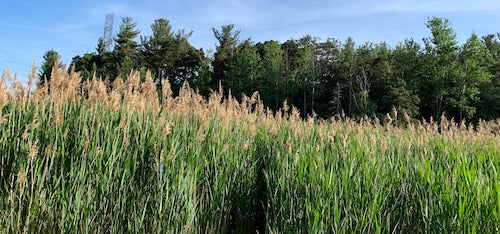
Waterloo biologists, in partnership with Agriculture and Agri-Food Canada and the University of Toronto, are working on a North American pilot program that uses moths as a management tool to control the invasive plant threatening Canadian wetlands.
“We’re one of the first 13 sites in North America to trial insect-based biocontrol for invasive phragmites,” says Dr. Rebecca Rooney. “This offers hope for chemical free invasive phragmites control.”
Phragmites, Phragmites australis, also known as European common reed is an invasive perennial grass that spreads quickly and out-competes native species for water, sunlight, and nutrients. It releases toxins from its roots into the soil to further hinder the growth of and kill surrounding plants - leading to a decrease in biodiversity and habitat.
There is no single method that is a ‘quick fix’ to manage phragmites, instead a continuous, multi-method approach is required for success and long-term results. Current removal methods include herbicides, prescribed fire, cutting underwater, flooding and physical removal.
However, two moth species - Lenisa geminipuncta and Archanara neurica - are natural enemies of the invasive plant. The goal is to use the moths as a biological control agent to help wetlands re-establish a natural balance.
"The biocontrol program for invasive Phragmites is the result of work by a large international team and has been in development for over 20 years," says Michael McTavish, a Waterloo alumus and current post doctoral fellow at the University of Toronto. "Starting with releases in 2019, AAFC and the University of Toronto have developed an operational protocol to rear, release, and monitor Phragmites biocontrol agents, and we are excited to expand the releases across southern Ontario with a growing team of collaborators."
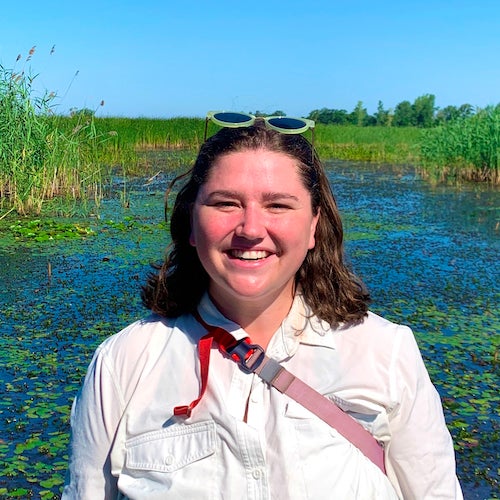
Claire Schon, a Waterloo biology master’s student in the Rooney lab, is assessing different methods of moth-release and will be monitoring both the damage to the phragmites plant as well as documenting any changes to the wetland plant community over time.
“As larvae, these two species of moths will bore into the stem of phragmites and eat all the tissue there, which damages the plant,” says Schon. “Moth-damaged stems typically either die, or form side shoots in an effort to compensate for the feeding damage."
To investigate this, Schon is using a total of 68 testing sites at two locations - on campus and at rare Charitable Research Reserve. She is testing two different release strategies for both species of moths. She is releasing moth eggs and larvae to see which stage is more effective at damaging phragmites in our climate.
Egg cups are placed on the plant with either 60 or 120 eggs in mid to late April. The hope is for the eggs to hatch when the plant puts up new shoots. This strategy is more efficient than using moth larvae which have to be grown in the lab, placed on some stems stuck into a foam that’s placed in the middle of a patch during mid to late May.
Early results suggest the moth larva are causing damage to the phragmites plant by burrowing into the stem, killing the section of plant above where the moth larva fed. While doing her stem density and height measurements, Schon noticed the health of the plants around her.
“In early June I was very excited to find my first moth-damaged stem, it looked like it was dying and I was able to find evidence of the larva’s entrance and exit hole” said Schon. “To me, this amazing as it was the first-time I got to see evidence of my experiment working."
Around mid-July the moth matures and can fly. At this point, it will mate and lay their eggs on leaf sheaths. This is important as only the invasive phragmites keeps its leaves. Native phragmite plants drop their leaves in the late summer so the moth eggs won’t mature and can’t eat the plant in spring. This is an important distinction that allows the moths to be effective at damaging only the invasive phragmites plant.
In the late summer, Schon measured how many stems were damaged in a square metre, as well as the number of larvae entrance and exits holes. She also took plant physiology measurements including the rate of carbon assimilation, and how efficient that plant is at using water as well as measurements of plant growth and reproduction like the plant biomass, plant height, and how many seeds are produced that will be processed during the winter.
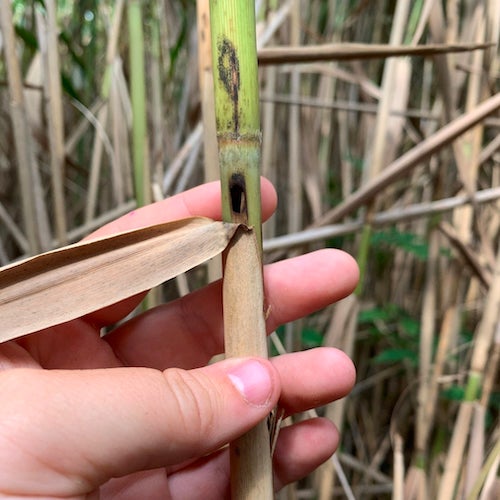
Moth-damaged phragmites stem.
Early results are promising for this new method of Phragmites control.
“We have found that moth-damaged stems are much shorter than healthy stems and rarely produce seed. Moth-damaged stems produce less biomass, and their rates of carbon assimilation are limited by the larval feeding,” explained Schon. “At our campus field site, we also found evidence that the moths had survived to adulthood.”
Next summer, she hopes to revisit the field sites and document any new moth damage from surviving eggs as well as record the changes to the plant community.
Celebrating retirees in 2022's fourth quarter
Human Resources has announced that the following employees retired on October 1, November 1 and December 1, 2022.
October 2022
- Barbara Redfearn, who joined the University in September 2000, retired as Account Co-ordinator in Co-operative and Experiential Education (CEE);
- Roslyn Keller, who started working at Waterloo in August 1970, retired as Library Associate - Catalog & Info Services in the Library;
- Vito Logiudice, who began working at the University in June 2008, retired as Director, Quantum-Nano Core Fabrication and Characterization Facility in the Office of Research;
- Dr. Christine Wiedman, who started her career at Waterloo in July 2006, retired as faculty member in the School of Accounting and Finance;
- Dr. Glen Heppler, who began working at the University in May 1986, retired as faculty member in Systems Design Engineering;
- Gracia Murase, who started at Waterloo in July 1980, retired as Microbiology Lab Technician in the Biology Department;
- Dennis Cok, who joined the University in July 2016, retired as ACE Project Manager in the Chemistry Department;
- Giselle Scanlon, who started at Waterloo in January 2015, retired as Lecturer at Renison University College;
- Laura Holtby, who began working at the University in September 2004, retired as Project Manager in the Propel Centre after a leave;
- Maria Sousa, who started at Waterloo in February 2000, retired as Custodian II in Plant Operations; and
- Anne Dvorachek, who started her career at the University in November 1984, retired as Secretary in the Classical Studies department.
November 2022
- Lynda McCutcheon, who joined the University in January 1991, retired as Grants & Contracts Manager in the Office of Research;
- Beverly Kuepfer, who started at Waterloo in August 1990, retired as On-Campus Courier in Central Stores;
- Georgia Mulholland, who started at the University in October 2015 on contract and was full-time as of March 2022, retired as Financial Officer in University Relations;
- Neil McManus, who began working at Waterloo in February 1988, retired as Senior Lab Instructor, Nanotechnology in the Department of Chemical Engineering;
- Christina Roberts, who started at the University in October 1981, retired as Director, Marketing and Undergraduate Recruitment in the Office of the Registrar;
- Thomas Dean, who began working at Waterloo in October 2010, retired as Technical Operations Director in the Department of Chemical Engineering;
- Janet Venne, who joined the University in August 1981, retired as Research Lab Assistant in the Institute for Quantum Computing; and
- Debbie Holden, who began working at Waterloo in January 2013, retired as Assistant Manager, Cleaning Services in Campus Housing.
December 2022
- Brad Winder, who joined the University in January 1991, retired as Residence Attendant in Campus Housing.
In addition, a retirement from September 2022 seems to have been overlooked in previous updates. Elena Hutuleac, who joined the University in October 28 but was on leave since January 2005, retired as Custodian in Plant Operations.
Congratulations to our last retiring cohort of 2022.
MAID needs to be an authentic choice

By Jon Parsons. This article originally appeared on Waterloo News.
Medical assistance in dying (MAID) raises many ethical issues, one of which is whether an absence of social support makes MAID an authentic choice.
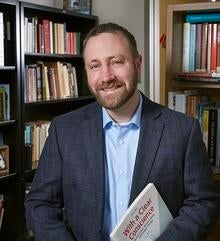
That’s the view of Dr. Andrew Stumpf, an assistant professor of philosophy at St. Jerome’s University, a federated institution of the University of Waterloo. Stumpf’s research focuses on ethics and end-of-life care.
“We need to support and promote people’s autonomy and the right to make important decisions about their body,” Stumpf says. “And what could be bigger than the decision about what happens regarding your death? But we need to be putting at least as much energy and attention into giving people the kind of support they need to live dignified lives.”
Providing adequate supports
With the federal government recently putting a pause on implementing the latest update to MAID, Stumpf says it’s a good time to re-examine key ethical issues.
Under the current rules for MAID, people with what are defined as grievous and irremediable medical conditions may seek assistance in ending their own lives. But sometimes this is not happening because of any medical condition on its own, but because they cannot access adequate housing or health-care.
Such cases have been widely reported in Canada in recent years, for example in CBC, Global News, CTV News, and City News.
“Having adequate social supports for people is a huge investment, but it’s something we need to do,” Stumpf continues. “It seems our current cultural attitude says, well, when you’re older or disabled, we just shift you off to the side and forget about you, but now here’s this other option of MAID you can avail yourself of. We need to be doing better on programs and supports that allow people to live their lives fully.”
Expanding and promoting palliative care
One key support that Stumpf sees as central to any discussion around MAID is palliative care – an approach to health-care and quality of life for people with serious or terminal illnesses. Palliative care is not always specific to immediate end-of-life care and may be appropriate for people who have illnesses for many years.
“The current approach makes MAID available to people and lets everybody know about MAID, but most people don’t know much about palliative care,” Stumpf says. “And palliative care is not readily accessible to people, at least in a high-quality form. That’s not really promoting autonomy, as I see it.”
Expanding availability and awareness of palliative care and providing adequate social support are things he sees as fundamental to creating authentic choices for MAID.
As part of his ongoing research, Stumpf founded the Kernel Network, an organization that aims to foster collaboration between academics and community partners on end-of-life research.
Waterloo sponsors International Women's Day activities
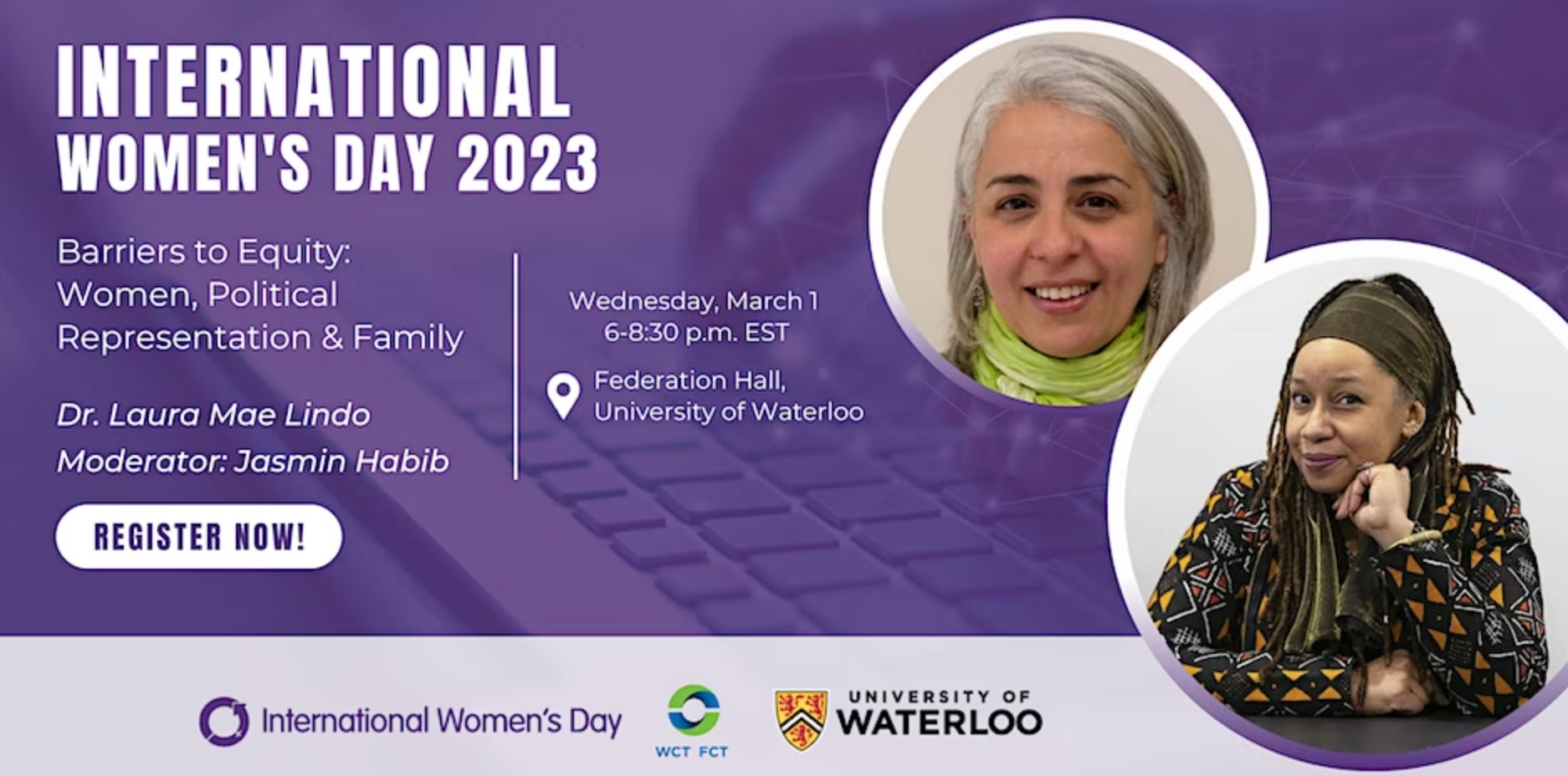
The University of Waterloo is a sponsor of International Women’s Day activities hosted by Women in Communications & Technology, Waterloo Region. Join Barriers to Equity: Women, Political Representation & Family for an intimate discussion with Dr. Laura Mae Lindo, moderated by Jasmin Habib, chair of Political Science. The event will take place on Wednesday, March 1 from 6:00 p.m. to 8:30 p.m. at Federation Hall. Register for the event.
Friday's notes
W Store and W Print locations will be closed all day on February 24 for inventory counting. Please send any questions to wstore@uwaterloo.ca or wprint@uwaterloo.ca.
The February 2023 IT Review Interim Report is now available for review. This report offers an update and identifies timelines for tasks/action items, other ideas being discussed within the working groups (lead by the co-leads), and cross-theme connections. Learn more on the IT Review website.
Senate nominations close on February 28. All eligible students, staff, and faculty are encouraged to put their name forward for consideration.
Nominees must provide a brief statement (100 words maximum) along with a completed nomination form to appear on the ballot.
Senate plays a crucial role in the day-to-day academic policy of the institution. Their responsibilities includes regulating curricula for all courses, determining standards of admission, and conferring degrees. Senate elections take place from March 2 to 9.
Senators serve two-year terms commencing in May. Senate meetings are held at 3:30 p.m. on the third Monday of each month. Senate does not meet in July and August.
For more information visit https://uwaterloo.ca/secretariat/nominations-elections.
IST is reporting that Quest will be down for scheduled maintenance on Saturday, February 25, from 6:45 a.m. to 11:00 a.m. During that time Quest will be down and unavailable.
Link of the day
40 years ago: The Pirates of Penzance
When and Where to get support
Students can visit the Student Success Office online for supports including academic development, international student resources, immigration consulting, leadership development, exchange and study abroad, and opportunities to get involved.
Instructors looking for targeted support for developing online components for blended learning courses, transitioning remote to fully online courses, revising current online courses, and more please visit Agile Development | Centre for Extended Learning | University of Waterloo (uwaterloo.ca).
Faculty, staff, post-doc and graduate student instructors can find upcoming teaching and learning workshops, self-directed modules and recordings of previous events on Centre for Teaching Excellence Workshops and Events page.
Instructors can access the EdTech Hub to find support on Waterloo’s centrally supported EdTech tools. The Hub is supported by members of IST’s Instructional Technologies and Media Services, Centre for Teaching Excellence, Centre for Extended Learning and subject matter experts from other campus areas.
Supports are available for employees returning to campus. Visit IST’s Hybrid Work and Technology guidelines and workplace protocols to assist with the transition.
Students with permanent, temporary and suspected disabilities and disabling conditions (medical conditions, injuries, or trauma from discrimination, violence, or oppression) can register with AccessAbility Services for academic accommodations (classroom accommodations, testing accommodations, milestone accommodations).
Instructors can visit AccessAbility Services' Faculty and Staff web page for information about the Instructor/Faculty role in the accommodation process. Instructors/Faculty members are legally required to accommodate students with disabilities. AccessAbility Services (AAS) is here to help you understand your obligations, and to offer services and resources to help you facilitate accommodations.
Did you know that the Writing and Communication Centre offers many in-person and virtual services to support you with any writing or communication project? This term we've added The Write Spot: a new student space in South Campus hall, complete with bookable workspaces, drop-ins with our peer tutors, and free coffee and tea. We also have one-to-one appointments with our writing and communication advisors and peer tutors, email tutoring for grads and undergrads, drop-ins at Dana Porter Library, online workshops, writing groups, English conversation practice, and even custom in-class workshops. For any communication project, the Writing and Communication Centre is here to support you.
Research Ethics: Find yourself with an ethical question, unsure if your work requires an ethics review, or need advice about putting together a research ethics application? Reach out to one of our friendly staff by booking a consultation or email us with your questions.
Co-op students can get help finding a job and find supports to successfully work remotely, develop new skills, access wellness and career information, and contact a co-op or career advisor.
The Centre for Career Action (CCA) has services and programs to support undergrads, grad students, postdocs, alumni, and employees in figuring out what they value, what they’re good at, and how to access meaningful work, co-op, volunteer, or graduate/professional school opportunities. Questions about CCA's services? Live chat, call 519-888-4047, or stop by our front desk in the Tatham Centre 8:30 a.m. to 4:30 p.m., Monday to Friday.
Drop-in to in-person Warrior Study Halls on Thursdays from 5:00 p.m. to 6:30 p.m. in DC and DP. Join a Peer Success Coach to set goals and work independently or in groups each week.
Renison's English Language Institute continues to offer virtual events and workshops to help students practice their English language skills.
If you feel overwhelmed or anxious and need to talk to somebody, please contact the University’s Campus Wellness services, either Health Services or Counselling Services. You can also contact the University's Centre for Mental Health Research and Treatment. Good2Talk is a post-secondary student helpline available to all students.
The Library is here to help, both in person and online. Our spaces are open for access to book stacks, study spaces, computers/printers, and the IST Help Desk. For in-depth support, meet one-to-one with Librarians, Special Collections & Archives and Geospatial Centre staff. Visit the Library’s home page to access our online resources for anywhere, anytime learning and research.
The Faculty Association of the University of Waterloo (FAUW) continues to advocate for its members. Check out the FAUW blog for more information.
The University of Waterloo Staff Association (UWSA) continues to advocate for its members. Check out the UWSA blog for more information.
The Office of Equity, Diversity, Inclusion & Anti-Racism (EDI-R) works with students, faculty and staff across campus to advance equity and Anti-racism through evidence-based policies, practices and programs. If you have a concern related to Anti-racism and/or equity, please complete our intake form.
The Sexual Violence Prevention and Response Office (SVPRO) supports all members of the University of Waterloo campus community who have experienced, or been impacted, by sexual violence. This includes all students, staff, faculty and visitors on the main campus, the satellite campuses, and at the affiliated and federated Waterloo Institutes and Colleges. For support, email: svpro@uwaterloo.ca or visit the SVPRO website.
The Office of Indigenous Relations is a central hub that provides guidance, support, and resources to all Indigenous and non-Indigenous campus community members and oversees the University's Indigenization strategy.
The Waterloo Indigenous Student Centre, based at United College, provides support and resources for Indigenous students, and educational outreach programs for the broader community, including lectures, and events.
WUSA supports for students:
Peer support - MATES, Glow Centre, RAISE, Women’s Centre - Click on one of the links to book an appointment either in person or online for the term.
Food Support Service food hampers are currently available from the Turnkey Desk 24/7 in the Student Life Centre. Drop-off locations are also open again in SLC, DC, DP, SCH, and all residences.
Co-op Connection all available online.
Centre for Academic Policy Support - CAPS is here to assist Waterloo undergraduates throughout their experience in navigating academic policy in the instances of filing petitions, grievances and appeals. Please contact them at caps@wusa.ca.
WUSA Student Legal Protection Program - Seeking legal counsel can be intimidating, especially if it’s your first time facing a legal issue. The legal assistance helpline provides quick access to legal advice in any area of law, including criminal. Just call 1-833-202-4571.
Empower Me is a confidential mental health and wellness service that connects students with qualified counsellors 24/7. They can be reached at 1-833-628-5589.
GSA-UW supports for graduate students:
The Graduate Student Association (GSA-UW) supports students’ academic and social experience and promotes their well-being.
Advising and Support - The GSA advises graduate students experiencing challenges and can help with navigating university policies & filing a grievance, appeal, or petition.
Mental Health covered by the Health Plan - The GSA Health Plan now has an 80 per cent coverage rate (up to $800/year) for Mental Health Practitioners. Your plan includes coverage for psychologists, registered social workers, psychotherapists, and clinical counselors.
Dental Care - The GSA Dental Plan covers 60 to 70 per cent of your dental costs and by visiting dental professionals who are members of the Studentcare Networks, you can receive an additional 20 to 30 per cent coverage.
Student Legal Protection Program - Your GSA fees give you access to unlimited legal advice, accessible via a toll-free helpline: +1-833-202-4571. This advice covers topics including housing disputes, employment disputes, and disputes with an academic institution.
The Graduate House: Open Monday to Tuesday 11:30 a.m. to 7:00 p.m. and Wednesday to Friday 11:30 a.m. to 9:00 p.m. We’re open to all students, faculty, staff, and community members. The Graduate House is a community space run by the GSA-UW. We’re adding new items to the menu. Graduate students who paid their fees can get discounts and free coffee.
When and Where
Fitness and Personal Training - Registrations opened January 5 this winter with Personal Training and Small Group Training as well as a Free Warrior Workout Program.
Student Health Pharmacy in the basement of the Student Life Centre is now offering Covid booster shots (Pfizer and Moderna) and flu shots. Call 519-746-4500 or extension 33784 for an appointment. Walk-ins always welcome.
Reading Week, Saturday, February 18 to Sunday, February 26.
Equitable Recruitment and Selection, Friday, February 24, 10:00 a.m. to 12 noon, online.
Warriors Women’s Volleyball OUA Quarter-Finals vs TMU, Saturday, February 25, 4:00 p.m., Carl Totzke Court, PAC. Purchase tickets.
Warriors Women’s Hockey OUA Quarter-Finals vs Brock (Game 3 – if necessary), Saturday, February 25, 7:00 p.m., CIF Arena. Purchase tickets.
Warriors Women’s Basketball OUA Quarter-Finals vs TBD, Saturday, February 25, 8:00 p.m., Carl Totzke Court, PAC. Purchase tickets.
Introduction to Disability Justice – Debrief Session, Monday, February 27, 11:00 a.m. to 12 noon, online.
Master of Taxation, Virtual Information Session, full-time program, Tuesday, February 28, 4:00 p.m. To register visit www.uwaterloo.ca/mtax.
Master of Taxation, Virtual Information Session, part-time program, Tuesday, February 28, 5:00 p.m. To register visit www.uwaterloo.ca/mtax.
NEW - Noon Hour Concert: Poland Parables, Wednesday, March 1, 12:30 p.m., Conrad Grebel University College Chapel, free admission.
Introduction to Equity – Debrief Session, Wednesday, March 1, 1:00 p.m. to 2:00 p.m., online.
Intentional Leadership armchair chat with Rose M. Patten, Wednesday, March 1, 1:30 p.m. to 2:30 p.m. Engineering 7 event space, 2nd floor.
The Long Arm of Theoretical Computer Science: A Case Study in Blockchains/Web3, Distinguished Lecture Series featuring Tim Roughgarden, Computer Science Department, Columbia University, Wednesday, March 1 at 3:00 p.m. in DC 1302.
NEW - Barriers to Equity: Women, Political Representation and Family, Wednesday, March 1, 6:00 p.m. to 8:30 p.m., Federation Hall
NEW - Core Research Facilities Town Hall, Thursday, March 2, 11:30 a.m. to 2:15 p.m., Enterprise Theatre, East Campus 5.
NEW - WaterTalk: Recognizing the spiritedness and agency of water: Personhood and other legal approaches, presented by Aimée Craft, Thursday, March 2, 11:30 a.m., DC 1302, lunch reception to follow in DC 1301.
NEW - DaCapo Chamber Choir, conducted by Leonard Enns, Professor Emeritus at Conrad Grebel University College, presents Winding Toward Peace, Saturday, March 4, 7:30 p.m. and Sunday, March 5, 3:00 p.m, Trillium Lutheran, Waterloo. With guest classical guitarist Mariette Stephenson. Limited tickets available. Pay-what-you-can pricing.